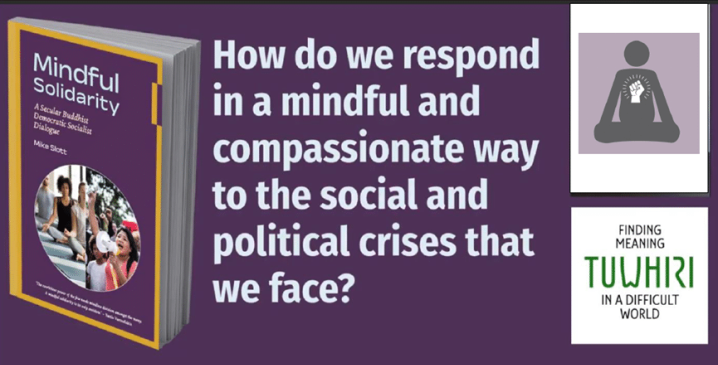On January 30, at 7 pm US Eastern Time, Craig Murphy, Seth Zuihō Segall, and Karsten Struhl joined Mike Slott for a discussion around his book, Mindful Solidarity: A Secular Buddhist Democratic Socialist Dialogue. The online discussion was sponsored by the Secular Buddhist Network and Tuwhiri, a secular Buddhist publishing imprint.
Mike began the event by emphasizing that the book is his effort to integrate his life-long commitment to radical political and labor activism and his engagement with secular Buddhism, which began in 2010. The book is an effort to articulate that integration while urging both political activists and meditators to learn from each other, incorporating the insights of each perspective and practice.
Mike noted that six key ideas underpin the book:
- A secular form of Buddhism is best suited to promoting the skills and virtues needed to create a flourishing life for all.
- While advocating for secular Buddhism, Mike's approach differs from Stephen Batchelor’s in several important ways.
- The goals of reducing suffering and promoting human flourishing require a radical transformation of existing social institutions, and such a radical transformation – while certainly not inevitable – is something that is possible given the human potential for intelligence and compassion.
- A non-deterministic, humanistic Marxism provides us with a strong foundation for understanding the social institutions which cause harm and how a radical transformation can and should occur.
- A “secular, radical engaged Buddhist” perspective allows us to look critically at some mainstream views and practices within western Buddhism, including the role of meditation and meditation retreats, as well as notions like the three marks of existence and the Bodhisattva path.
- That same perspective enables us to identify two basic problems in how the Left has functioned: the notion that there is one “correct” political line and a simplistic model of what counts as the best form of political activism.
Karsten, Seth, and Craig then offered their reactions and comments regarding the book.
Karsten explored the relationship between Marxism and Buddhism, highlighting the ways in which both perspectives are radical in the sense that they identify the root causes of suffering and offer ways to reduce suffering and promote flourishing. An approach which integrates these perspectives reveals how the individual (Buddhist) and social (Marxist) causes of suffering mutually constitute each other.
Seth found many areas of agreement with Mike, including the notion of a secular dharma which is naturalistic, pragmatic, and oriented toward flourishing. His main disagreement with the book is Mike's advocacy of a radical transformation of society. Seth explored the obstacles and dangers of such radical efforts and movements, calling instead for an incremental and cautious approach to social change.
Craig agreed with Mike that we need to recognize that social institutions are a prime source of harm. He discussed how, despite the many problems and crises we are currently facing, efforts to create fundamental social reforms based on solidarity and mass movements have led to major improvements in the last 100 years: a reduction in violence and wars, less famines and poverty, and an expansion of human rights. He pointed to the popular movements which led to the collapse of undemocratic Communist regimes in eastern Europe and the campaigns to create international organizations to address social, economic, and political problems.
To view the online discussion, click below:












